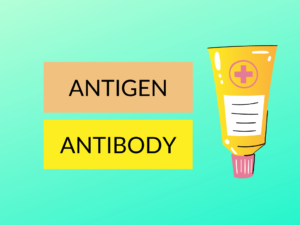Monoclonal antibodies and polyclonal antibodies are two types of antibodies that have different properties and uses in medical and scientific research. In this article, we will discuss the differences between these two types of antibodies in terms of their definition, examples, uses, and other characteristics.
What are Monoclonal Antibodies?
Monoclonal antibodies (mAbs) are antibodies that are derived from identical cells that are produced by a single clone of immune cells. They target a specific antigen or pathogen and bind specifically to its surface. These antibodies are produced by a process of fusion of an immortalized B-cell (called a myeloma cell) with a normal B-cell that has been stimulated by an antigen.
Examples of Monoclonal Antibodies
There are different types of monoclonal antibodies based on their target antigen and the disease they are intended to treat. Some examples include:
1. Rituximab – used to treat certain types of cancer, such as non-Hodgkin’s lymphoma.
2. Infliximab – used to treat autoimmune diseases such as rheumatoid arthritis.
3. Trastuzumab – used to treat breast cancer.
Uses of Monoclonal Antibodies
Monoclonal antibodies have various uses in medical and scientific research. Some of their applications include:
1. Diagnosis of diseases – Monoclonal antibodies are used in diagnostic kits to detect the presence of specific proteins or antigens in body fluids or tissues that are indicative of certain diseases.
2. Cancer therapy – Monoclonal antibodies are used to treat different types of cancers by recognizing and binding to cancer cells, thus activating the immune system to destroy them.
3. Immunomodulation – Monoclonal antibodies are also used for immunomodulation, which involves altering the immune system’s response to disease antigens.
What are Polyclonal Antibodies?
Polyclonal antibodies (pAbs) are antibodies that are derived from a mixture of B-cells produced in response to an antigen. They recognize multiple epitopes on the same antigen and can bind to various antigenic determinants.
Examples of Polyclonal Antibodies
Some examples of polyclonal antibodies include:
1. Antisera – This is a type of polyclonal antibody that is derived from the serum of an animal that has been injected with a specific antigen.
2. Rheumatoid factor – This is a type of polyclonal antibody that is present in patients with rheumatoid arthritis.
Uses of Polyclonal Antibodies
Polyclonal antibodies have various applications in medical and scientific research. Some of their uses include:
1. Diagnosis of diseases – Polyclonal antibodies are used in diagnostic kits to detect the presence of specific proteins or antigens in body fluids or tissues that are indicative of certain diseases.
2. Immunoprecipitation – Polyclonal antibodies are used in immunoprecipitation experiments, which involve the isolation of a specific protein or antigen from a mixture of substances.
3. Western blotting – Polyclonal antibodies are used in western blotting experiments, which involve the detection of specific proteins in a sample.
Differences between Monoclonal Antibodies and Polyclonal Antibodies
The following table summarizes the differences between monoclonal antibodies and polyclonal antibodies:
| Difference area | Monoclonal Antibodies | Polyclonal Antibodies |
|————————————|———————–|————————-|
| Source | Single clone of cells | Mix of B-cells |
| Specificity | High | Low |
| Production method | Hybridoma technology | Animal immunization |
| Epitope recognition | Single epitope | Multiple epitopes |
| Binding affinity | High | Low |
| Cost | High | Low |
| Time | Longer | Shorter |
| Stability | More stable | Less stable |
| Consistency | More consistent | Less consistent |
| Reproducibility | High | Low |
Conclusion
In summary, monoclonal antibodies and polyclonal antibodies are two types of antibodies that have different characteristics and applications in medical and scientific research. Monoclonal antibodies are produced from identical cells and have high specificity and binding affinity, while polyclonal antibodies are produced from a mixture of B-cells and have lower specificity and binding affinity.
Knowledge Check
1. What is the main difference between monoclonal antibodies and polyclonal antibodies in terms of their source?
Answer: Monoclonal antibodies are derived from a single clone of cells, while polyclonal antibodies are derived from a mixture of B-cells.
2. Which type of antibody has higher specificity and binding affinity – monoclonal or polyclonal antibodies?
Answer: Monoclonal antibodies have higher specificity and binding affinity.
3. Which type of antibody is produced using hybridoma technology?
Answer: Monoclonal antibodies.
4. Which type of antibody is used in immunoprecipitation experiments?
Answer: Polyclonal antibodies.
5. Which type of antibody is more stable – monoclonal or polyclonal antibodies?
Answer: Monoclonal antibodies are more stable.
6. Which type of antibody is less consistent – monoclonal or polyclonal antibodies?
Answer: Polyclonal antibodies are less consistent.
7. Which type of antibody is used in diagnostic kits to detect the presence of specific proteins or antigens in body fluids or tissues?
Answer: Both monoclonal and polyclonal antibodies are used in diagnostic kits.
8. Which type of antibody has higher reproducibility – monoclonal or polyclonal antibodies?
Answer: Monoclonal antibodies have higher reproducibility.
9. Which type of antibody is used in cancer therapy?
Answer: Monoclonal antibodies.
10. Which type of antibody is less expensive – monoclonal or polyclonal antibodies?
Answer: Polyclonal antibodies are less expensive.
Related Topics
1. Immunoglobulins – Types, Functions, and Differences.
2. Antibody-Drug Conjugates – Types, Methods, and Applications.
3. ELISA vs. Western Blotting – Differences and Applications.


